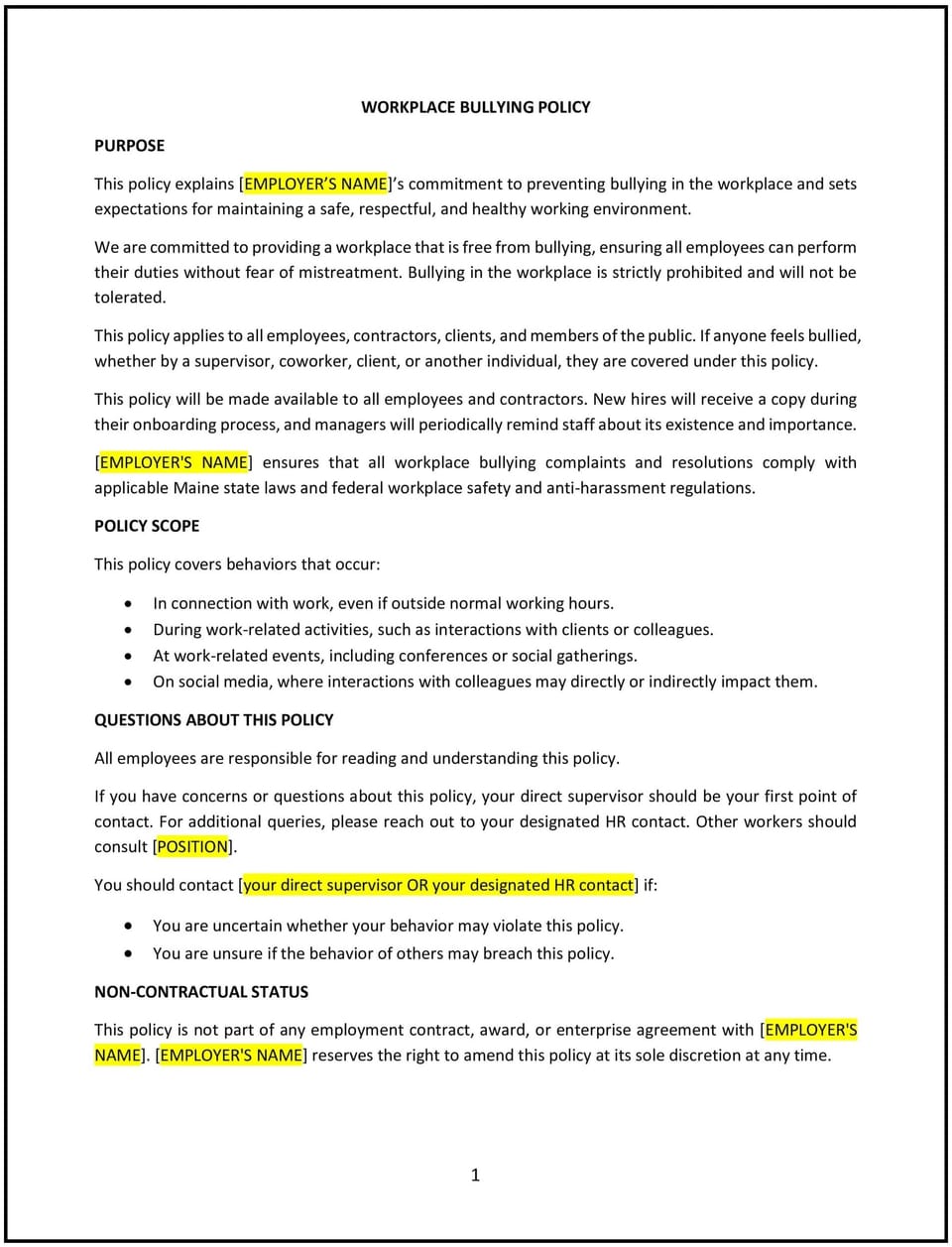Workplace bullying policy (Maine): Free template

Workplace bullying policy (Maine): Free template
This workplace bullying policy is designed to help Maine businesses prevent and address bullying behaviors in the workplace. It outlines the company's stance on bullying, the types of behavior that are considered bullying, the process for reporting incidents, and the steps taken to resolve issues effectively.
By implementing this policy, Maine businesses can foster a respectful and productive work environment, minimize the risk of workplace harassment, and ensure that all employees are treated fairly and with dignity.
How to use this workplace bullying policy (Maine)
- Define workplace bullying: Clearly define what constitutes workplace bullying, including verbal, physical, and psychological abuse, as well as any behavior that creates a hostile, intimidating, or offensive work environment.
- Set expectations for behavior: Establish clear behavioral expectations for employees, emphasizing that bullying will not be tolerated in any form, whether it’s between employees, between managers and staff, or from customers or clients.
- Outline reporting procedures: Provide clear instructions for employees to report bullying, including how to submit complaints, who to contact (e.g., HR, management), and the level of confidentiality they can expect.
- Ensure fair investigation: Describe the process for investigating bullying claims, ensuring that all allegations are taken seriously and investigated promptly. The process should include gathering information, interviewing parties involved, and determining appropriate actions based on the findings.
- Address disciplinary actions: Detail the disciplinary actions that will be taken if an employee is found to be engaged in bullying behavior. These actions could range from counseling and warnings to suspension or termination, depending on the severity of the bullying.
- Promote prevention: Encourage employees to participate in training on bullying prevention and conflict resolution, and create a work culture that values respect and collaboration.
- Review regularly: Periodically review and update the policy to ensure that it aligns with any changes in Maine state laws, best practices, or organizational needs.
Benefits of using this workplace bullying policy (Maine)
Implementing this policy provides several benefits for Maine businesses:
- Promotes a respectful work environment: By addressing bullying, businesses foster a culture of respect, which contributes to better employee morale and overall workplace satisfaction.
- Reduces legal risks: A clear anti-bullying policy helps businesses comply with Maine state laws and reduces the risk of legal actions related to workplace harassment or discrimination.
- Increases productivity: A bullying-free environment allows employees to focus on their work without the fear of intimidation or harassment, improving overall productivity and collaboration.
- Enhances employee retention: Employees are more likely to stay with a company that values their well-being and provides a safe, supportive work environment.
- Improves company reputation: A commitment to preventing bullying enhances the company’s reputation, making it an attractive place for top talent and business partnerships.
Tips for using this workplace bullying policy (Maine)
- Communicate the policy clearly: Ensure that all employees understand the bullying policy by including it in the employee handbook and discussing it during onboarding and regular training sessions.
- Provide regular training: Offer periodic training on bullying prevention, conflict resolution, and how to create a respectful workplace. This ensures that employees are equipped to identify and address bullying behavior effectively.
- Encourage early intervention: Promote a culture where employees feel comfortable reporting bullying incidents early, before they escalate. Encourage managers to address potential issues proactively.
- Support affected employees: Provide appropriate support to employees who experience bullying, including access to counseling or employee assistance programs (EAPs).
- Monitor workplace culture: Regularly assess the workplace environment and employee interactions to ensure that the policy is being followed and that bullying does not occur.
Q: What constitutes workplace bullying?
A: Workplace bullying includes any repeated, aggressive behavior that creates a hostile work environment, such as verbal abuse, physical intimidation, spreading false rumors, or other behaviors that undermine an employee’s dignity.
Q: How should employees report bullying?
A: Employees should report bullying incidents to HR or their manager as soon as possible. The report can be made in person, in writing, or through a confidential reporting system, depending on the company's process.
Q: How will bullying complaints be handled?
A: All complaints will be investigated promptly and thoroughly. The business will ensure that the investigation is fair, confidential, and impartial, and that appropriate action is taken based on the findings.
Q: What actions will be taken if an employee is found guilty of bullying?
A: Disciplinary actions may range from counseling or a warning to suspension or termination, depending on the severity of the bullying behavior. The company will ensure that the actions are consistent with the company’s disciplinary policy.
Q: How can businesses prevent workplace bullying?
A: Businesses can prevent bullying by promoting a culture of respect, providing regular training on bullying prevention and conflict resolution, and addressing issues proactively before they escalate.
Q: Are employees protected from retaliation if they report bullying?
A: Yes, employees are protected from retaliation for reporting bullying or participating in investigations. Retaliation will not be tolerated and will be addressed according to the company’s disciplinary procedures.
Q: How often should businesses review their workplace bullying policy?
A: The policy should be reviewed annually or whenever there are updates to Maine state laws or changes in company practices that may affect the policy’s effectiveness.
This article contains general legal information and does not contain legal advice. Cobrief is not a law firm or a substitute for an attorney or law firm. The law is complex and changes often. For legal advice, please ask a lawyer.


